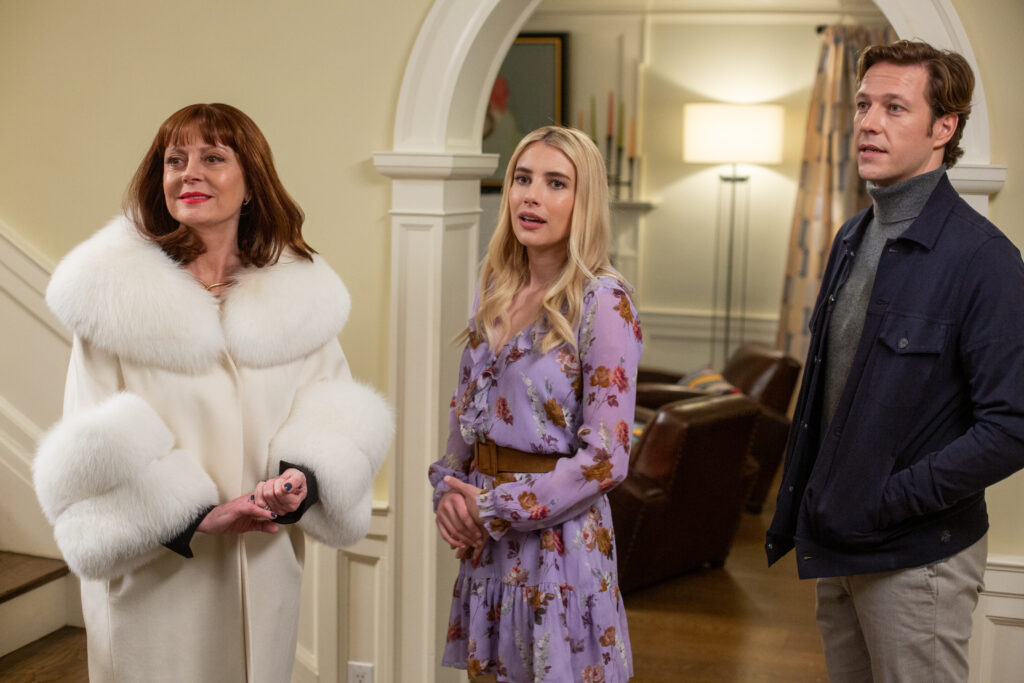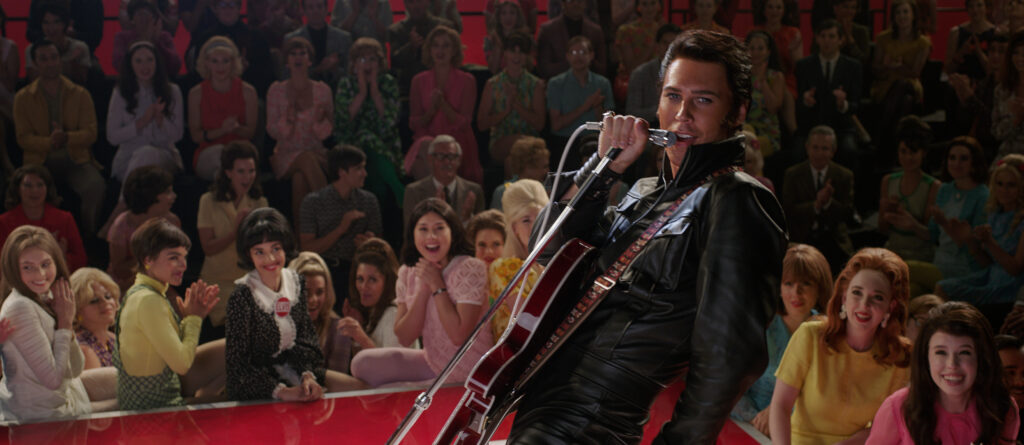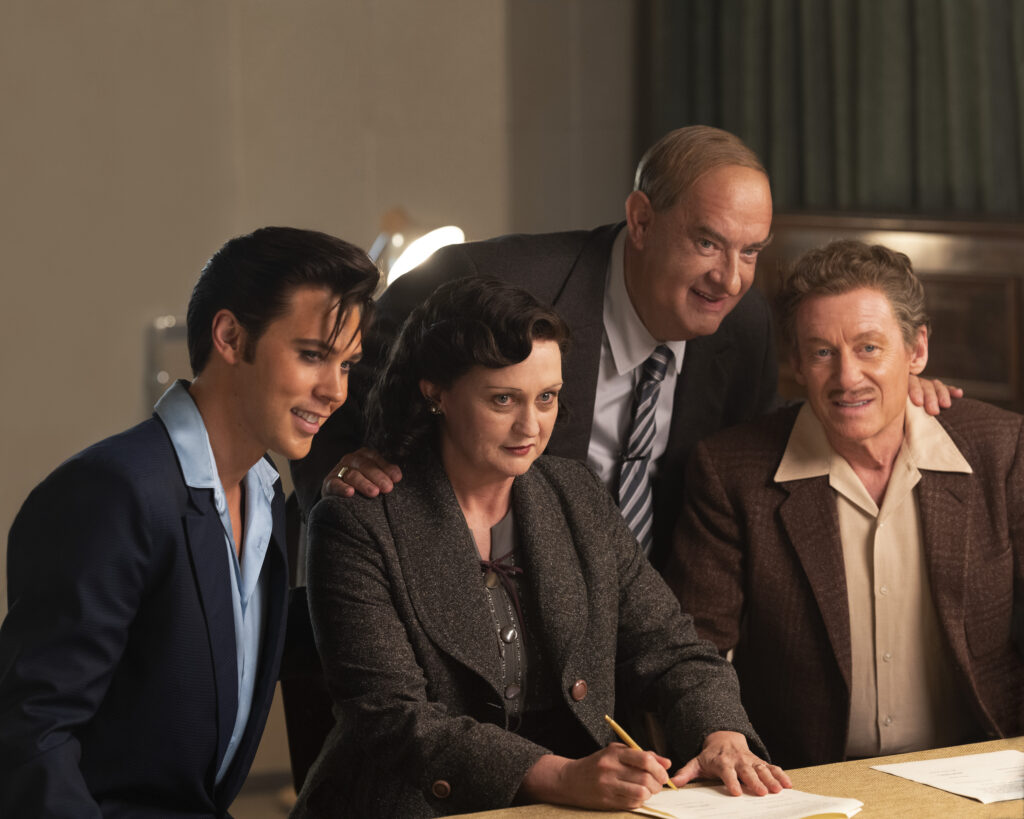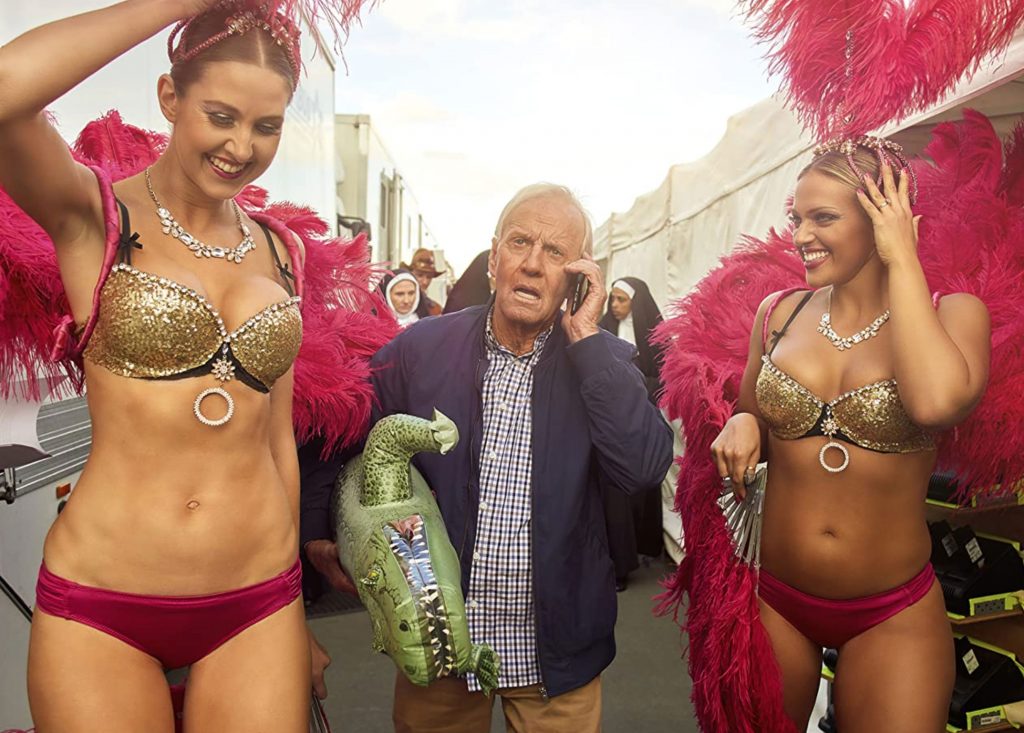April 6, 2023
by Carla Hay

Directed by Andy Fickman
Culture Representation: Taking place in Massachusetts, Maine, and California, over the course of 17 years, the comedy/drama film “One True Loves” features a white and Asian cast of characters (with a few African Americans) representing the working-class and middle-class.
Culture Clash: Four years after her husband goes missing in a helicopter crash and is declared dead, a woman gets engaged to a man who was her best friend in childhood, but then the missing husband shows up and expects to continued his married life with the woman.
Culture Audience: “One True Loves” will appeal primarily to people who are fans of the book on which the movie is based, and will appeal to people who like very corny love stories where people act unrealistically.
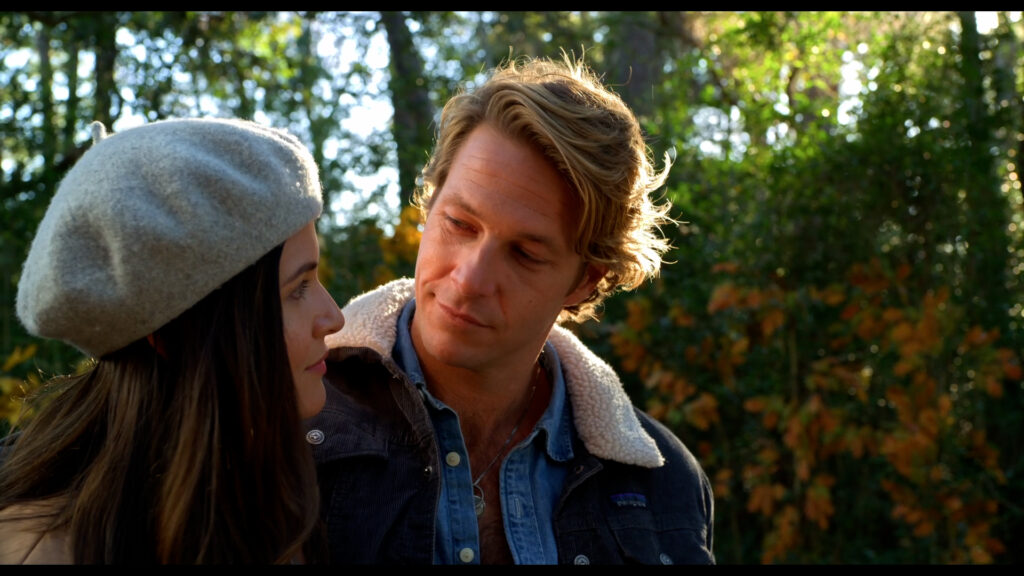
“One True Loves” is a disappointing, missed opportunity to turn a popular book into a classic romantic comedy/drama movie. The principal cast members do their best in their attempts to make this story convincing, but they are undercut by screenwriting and direction that make this sappy film look like the cinematic equivalent of a cheap and often-unrealistic romance novel. The “One True Loves” movie (which is based on Taylor Jenkins Reid’s 2016 novel of the same name) fails to balance the comedy and drama, which results in the film having an off-kilter and awkward tone.
Directed by Andy Finkman, “One True Loves” has a screenplay co-written by Jenkins Reid and her husband, Alex J. Reid. A few elements of the movie’s story are based on Jenkins Reid’s own life. (She’s from Acton, Massachusetts, where most of the story takes place.) This movie is an example of how people who are too close to the source material sometimes aren’t the best people to adapt the source material into a movie screenplay. Although “One True Loves” has its charming moments, thanks largely to the talent of the principal cast members, so much of the movie looks too phony to have the intended impact.
Another problem with the “One True Loves” movie is the jumbled narrative. There are several flashbacks, and some of them aren’t very well-placed. In addition, the characters in the love triangle, who are supposed to be in their 30s for most of the movie, often act like the immature teenagers they are in a few of the movie’s flashbacks. It’s all very grating. And it further lowers the quality of what could have been a more meaningful and relatable film about adults.
“One True Love” begins with a flashback to a nighttime house party attended by high-school-age teenagers in Acton, Massachusetts. Emma Blair (played by Oona Yaffe) and her best friend Sam Lee (played by Phinehas Yoon) are standing by themselves and looking kind of like outcasts. Emma and Sam are in the backyard, near the swimming pool, where athletic and good-looking Jesse Lerner (played by Cooper van Grootel) is emerging from the pool. Jesse is a star of the school’s male swimming team.
Emma has a big crush on Jesse and is ogling his toned body as he walks out of the pool. It’s later revealed that Sam has been in love with Emma for years, but she has kept him in the “friend zone,” and he has been afraid to tell her his true romantic feelings. Sam sees Emma leering at Jesse. Sam responds by saying in a sulking voice, “It’s really not fair that he throws around his swimming skills at a party.”
The party gets broken up by police. Most of the teenagers scatter, but Emma and Jesse are arrested for underage drinking. At the police station, Jesse flirts a little with Emma, who is awestruck and flattered that he’s paying attention to her. It doesn’t take long for Emma to let Jesse know that she wants to date him. What happens in the Sam/Emma/Jesse love triangle then jumps back and forth in time in the movie.
The next thing that viewers see is 15 years after this party, Emma (played by Phillipa Soo) and Sam (played by Simu Liu) are living together and have gotten engaged. Emma and Sam are happily celebrating the engagement with a small family get-together at the home of Emma’s parents. Emma’s relatives at this gathering are her parents, her sister and her sister’s husband. Sam’s family members are not seen or mentioned in the film.
Emma’s parents—mild-mannered father Colin (played by Michael O’Keefe) and talkative mother Ann (played by Lauren Tom)—own a local bookstore called Blair Books. Now a retired couple, Emma’s parents have passed on operation of the bookstore to Emma and her sister Marie (played by Michaela Conlin), who has a Type-A, perfectionist personality. Marie and her quiet husband Michael (played Tom Everett Scott) have a daughter who’s about 6 or 7 years old named Sophie (played by Oceana Matsumoto), who happens to be deaf.
When Emma was a teenager, she told Jesse that she had no interest in taking over the family bookstore when her parents retire. She wanted to travel and see the world. Flashbacks show that after high school, Emma became a travel journalist, Jesse (played by Luke Bracey) became a travel photographer, and they worked together on adventurous travel assignments that took them around the world. They were blissfully in love, got married, and lived in Venice, California.
But then, a tragedy happened. Jesse was in a helicopter that crashed over the Pacific Ocean. There were three people in the helicopter, including the pilot. Jesse was the only person whose body wasn’t found after an extensive search. Jesse was eventually declared legally dead. Emma didn’t want to believe he was dead, but she gave up hope after practical-minded Marie convinced her to move on with her life.
A depressed Emma had a hard time coping with her grief. Flashbacks show that after years of not being in contact with Sam, she happened to see him in a music instrument store. Sam is now a music teacher at the same high school where he, Emma and Jesse were students. Sam and Emma reconnected, a romance began between them, and they got engaged. But four years after Jesse disappeared, Jesse has been found. Jesse comes back to Acton, and he’s expecting his marriage to Emma to continue in the way that it was.
All this timeline jumping does a disservice to the story in the movie, which answers some questions too late and doesn’t answer some questions at all. It isn’t shown until the last third of the movie how the romance developed between Sam and Emma. The courtship of Sam and Emma should have been in the movie much earlier, to give viewers better context for why she fell in love with him.
Because “One True Loves” shows too early in the movie that Sam and Emma have settled into a life where they got engaged, it makes it too easy to figure out how this movie is going to end. A better-written movie would have shown everything in chronological order. It would have made the movie more suspenseful and less obvious about what Emma’s choice will be. “One True Loves” tries to make up for this scrambled timeline by doing a lot of exposition regurgitation, where characters give verbal summaries of things that were already seen in flashbacks.
But there are other big problems with this movie. When Emma gets the call that Jesse has been found, her reaction looks completely phony. She doesn’t ask anything about how he was found, where he was for all these years, and if he’s okay. Yes, she could have been in shock, but these are the questions that someone would ask about a loved one who was missing for years and presumed dead. Viewers don’t find out where Jesse was for the past four years until it’s mentioned later in the movie: He was stranded on a deserted island.
Emma’s reunion with Jesse also looks fake. He’s dropped off at his parents’ house, with no mention of how Jesse was found or if he needed any medical treatment after being stuck on a deserted island for four years. Realistically, a bunch of media people are waiting outside the house. Jesse’s mother Francine (played by Beth Broderick), Jesse’s father Joe (played by Gary Hudson) and Emma are also outside, in anticipation of Jesse’s return.
But then, the scene looks unrealistic again when Emma and Jesse go inside his parents’ house. Jesse and Emma sob and hug, but she still doesn’t ask a lot of basic questions that someone would ask a spouse who’s been missing for four years. All the drippy emotions that are overloaded in this reunion scene would have had a better impact if the filmmakers put more realism in the movie.
And speaking of destroying realism, the filmmakers make Sam look pathetic in multiple scenes where he uses his orchestra class as a way to have personal therapy sessions for himself. Instead of teaching his students, he pours out his angst and insecurities over the decision that Emma has to make in choosing between him and Jesse. What’s so idiotic about these scenes is that Sam brushes off journalists who want to interview him because he says he’s a “private person,” but he inappropriately dumps details about his love life on his underage students, as if these students wouldn’t blab and gossip about it to other people.
Sam’s students egg him on, because they want to hear all the soap opera-ish details of this love triangle. And can you blame the students for doing that? No. It’s a distraction from doing any work in the classroom. It’s really up to the adult teacher in the classroom to set boundaries, but Sam doesn’t set those boundaries. He’s more concerned about getting as many people as possible to feel sorry for him and root for him. It’s supposed to be the “comedy” part of the movie, but it just looks weird and idiotic.
How bad are these classroom “therapy” scenes? When the school bell rings for the students to go to their next class, the students say that they want to stay and listen to more of Sam’s self-pitying sob stories. And he says they can stay. Eventually, some teachers are seen in the classroom because they want to listen to Sam’s sob stories too. It’s just more moronic filmmaking on display. “One True Loves” also has a very unfunny recurring gag about Sam’s cell phone getting cracked because he keeps throwing the phone in anger and frustration.
At no point in time does “One True Loves” show Sam, Jesse or Emma seeking professional counseling from adults or getting free support from their loved ones about this big disruption in their lives. Sam, Jesse and Emma also don’t seem to have any friends to turn to during this very unusual love triangle situation. And that detail doesn’t match up with the scene of Emma and Jesse’s wedding, where there were plenty of people in attendance, and presumably not all of them were family members.
Instead, what viewers will see in “One True Loves” are tedious scenes of Emma being “torn between two lovers” and feeling guilty about having to choose one over the other. The movie has some heartfelt scenes, such as when Emma and Jesse take a getaway trip to Maine at the remote cabin where they had their honeymoon. Soo and Bracey do some of their best acting in the movie in these Maine scenes. (“One True Loves” was actually filmed in Wilmington, North Carolina.)
The courtship scenes of Emma and Sam are cute, but very lightweight. Liu has potential as a romantic leading actor with very good comedic timing. He also has impressive singing and songwriting talent: He co-wrote and performed the movie’s end-credits ballad “Don’t.” It’s too bad that this movie makes the Sam character look like the most immature and most pitiful of the three characters in this love triangle.
Emma and Marie had an argumentative sibling rivalry when they were younger. This rivalry is mentioned several times but is never really given much depth, although there is an attempt in a flashback scene where Jesse has been missing for several weeks. Emma is in California, on a building rooftop near the Pacific Ocean, while she is using binoculars to look for Jesse. It’s the scene where Marie arrives and tells Emma to stop looking for Jesse because he’s probably dead.
Although this scene is meant to be the movie’s biggest heart-to-heart moment between Emma and Marie, observant viewers will be distracted by the questions that this scene brings up. Why does Emma think that using binoculars would be enough to search for Jesse in an ocean? And why does Emma think that she can see him from this particular rooftop? Emma tells Marie that because Jesse was a champion swimmer, if he’s alive, Emma is sure he’ll find a way to swim back to Emma.
Just because Emma is this stupid doesn’t mean that the filmmakers of “One True Loves” have to treat viewers as this stupid. The cast members can have as much charisma as they want, but when the filmmakers have such disrespect for the average viewer who would be interested in this type of movie, there’s no redeeming it or excusing it. “One True Loves” is like a suitor who tries to come across as romantic, but is in fact very pandering and condescending. People who value their time and intelligence just don’t need that in their lives.
The Avenue will release “One True Loves” in select U.S. cinemas on April 7, 2023. A one-night-only sneak preview was held in select U.S. cinemas on April 5, 2023. The movie will be released on digital on April 14, 2023, and on VOD on April 28, 2023.


